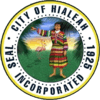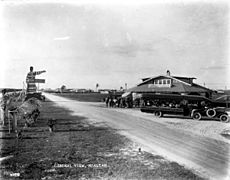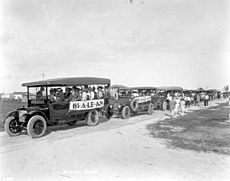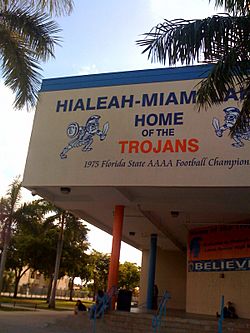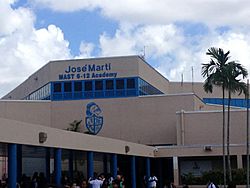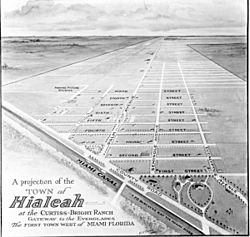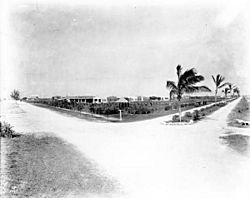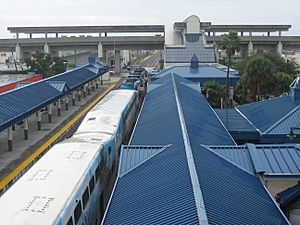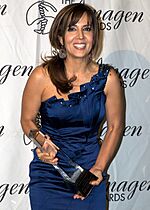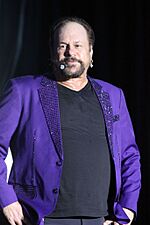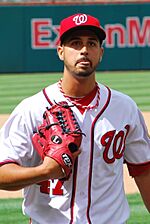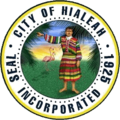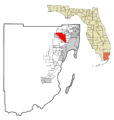Hialeah, Florida facts for kids
Quick facts for kids
Hialeah, Florida
|
|||
|---|---|---|---|
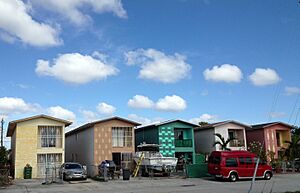
Houses in Hialeah
|
|||
|
|||
| Nickname(s):
"The City of Progress"
|
|||
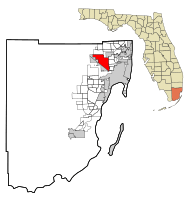
Location in Miami-Dade County and the state of Florida
|
|||
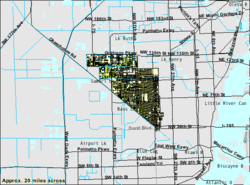
U.S. Census Bureau map showing city limits prior to most recent annexation
|
|||
| Country | |||
| State | |||
| County | |||
| Incorporated | September 10, 1925 | ||
| Government | |||
| • Type | Mayor-Council | ||
| Area | |||
| • City | 22.82 sq mi (59.09 km2) | ||
| • Land | 21.58 sq mi (55.90 km2) | ||
| • Water | 1.24 sq mi (3.20 km2) | ||
| Elevation | 7 ft (2 m) | ||
| Population
(2020)
|
|||
| • City | 223,109 | ||
| • Estimate
(2023)
|
221,300 | ||
| • Density | 10,338.21/sq mi (3,991.52/km2) | ||
| • Metro | 6,166,488 | ||
| Time zone | UTC−5 (EST) | ||
| • Summer (DST) | UTC−4 (EDT) | ||
| ZIP codes |
33002, 33010-33018
|
||
| Area code(s) | 305, 786, 645 | ||
| FIPS code | 12-30000 | ||
| GNIS feature ID | 0305059 | ||
Hialeah (pronounced HY-ə-LEE-ə) is a city in Miami-Dade County, Florida, United States. It is the sixth-largest city in Florida, with a population of over 223,000 people as of 2020. Hialeah is part of the larger Miami metropolitan area, which has millions of residents. The city is located west-northwest of Miami.
A special thing about Hialeah is that most of its residents are of Hispanic background. In 2020, about 94% of the people in Hialeah were Hispanic. It also has the highest number of Cuban and Cuban-American residents of any city in the U.S. Many people in Hialeah speak Spanish at home, making it an important part of daily life.
You can get around Hialeah using the Miami Metrorail system, which has several stations in the city. These stations help people travel to places like Downtown Miami and Miami International Airport.
Contents
History of Hialeah
The name "Hialeah" comes from the Muskogee or Seminole languages. It means "pretty prairie" or "Upland Prairie." The city is built on a large, flat area of land between Biscayne Bay and the Everglades.
How Hialeah Started
In 1921, a pilot named Glenn Curtiss and a cattleman named James H. Bright noticed this beautiful prairie. They decided to develop a town there. They also created the famous Hialeah Park Race Track. The town was officially named and planned out in 1921.
Early Entertainment and Challenges
In the 1920s, Hialeah was a place for fun and entertainment. People enjoyed sports like jai alai (a fast-paced ball game) and greyhound racing. Movies were even made there! However, a big hurricane in 1926 caused a lot of damage and stopped many of these activities.
Hialeah Park Race Track
The Hialeah Park Race Track opened in 1925. It was a very grand place, known for its beautiful Mediterranean style. Many famous people visited, including the Kennedy family, Harry Truman, and Winston Churchill. The park is also a special place for birds, as it is an Audubon Bird Sanctuary, famous for its pink flamingos. It is even listed on the National Register of Historic Places.
A famous pilot, Amelia Earhart, said her last goodbyes to the U.S. from Hialeah in 1937 before her final flight around the world.
Growth and Community Changes
Hialeah was first planned as a fancy playground, but it changed over time. After 1959, many Cuban exiles came to Hialeah, seeking a new home after the Cuban Revolution. These new residents, along with World War II veterans and city planners, helped turn Hialeah into a strong working-class community. It became a place where different groups built a new life.
Hialeah has grown very quickly. From only 1,500 people in 1925, it now has over 224,000 residents, making it one of Florida's largest cities.
Geography and Climate
Hialeah is located at about 25.86 degrees North latitude and 80.29 degrees West longitude.
The city covers about 19.7 square miles (51 square kilometers). Most of this area is land (19.2 square miles or 49.7 square kilometers), with a small part being water (0.5 square miles or 1.3 square kilometers).
Climate in Hialeah
Hialeah has a tropical monsoon climate. This means it has warm temperatures all year round and a wet season with a lot of rain.
| Climate data for Hialeah, Florida, 1991–2020 normals, extremes 1940–present | |||||||||||||
|---|---|---|---|---|---|---|---|---|---|---|---|---|---|
| Month | Jan | Feb | Mar | Apr | May | Jun | Jul | Aug | Sep | Oct | Nov | Dec | Year |
| Record high °F (°C) | 89 (32) |
96 (36) |
98 (37) |
96 (36) |
99 (37) |
99 (37) |
100 (38) |
99 (37) |
97 (36) |
97 (36) |
92 (33) |
90 (32) |
100 (38) |
| Mean maximum °F (°C) | 84.2 (29.0) |
86.4 (30.2) |
88.7 (31.5) |
90.7 (32.6) |
92.9 (33.8) |
93.7 (34.3) |
94.9 (34.9) |
94.3 (34.6) |
93.0 (33.9) |
91.5 (33.1) |
87.4 (30.8) |
85.5 (29.7) |
96.2 (35.7) |
| Mean daily maximum °F (°C) | 75.7 (24.3) |
77.7 (25.4) |
79.8 (26.6) |
83.2 (28.4) |
86.1 (30.1) |
88.4 (31.3) |
89.9 (32.2) |
90.1 (32.3) |
88.5 (31.4) |
85.6 (29.8) |
80.9 (27.2) |
77.6 (25.3) |
83.6 (28.7) |
| Daily mean °F (°C) | 67.4 (19.7) |
69.8 (21.0) |
72.1 (22.3) |
75.9 (24.4) |
79.1 (26.2) |
82.0 (27.8) |
83.3 (28.5) |
83.5 (28.6) |
82.1 (27.8) |
79.2 (26.2) |
73.9 (23.3) |
70.2 (21.2) |
76.6 (24.8) |
| Mean daily minimum °F (°C) | 59.1 (15.1) |
61.9 (16.6) |
64.5 (18.1) |
68.5 (20.3) |
72.2 (22.3) |
75.5 (24.2) |
76.7 (24.8) |
76.9 (24.9) |
75.8 (24.3) |
72.8 (22.7) |
66.8 (19.3) |
62.9 (17.2) |
69.5 (20.8) |
| Mean minimum °F (°C) | 44.8 (7.1) |
48.0 (8.9) |
52.0 (11.1) |
58.9 (14.9) |
65.4 (18.6) |
70.3 (21.3) |
71.2 (21.8) |
71.5 (21.9) |
71.4 (21.9) |
63.9 (17.7) |
55.3 (12.9) |
48.7 (9.3) |
41.9 (5.5) |
| Record low °F (°C) | 28 (−2) |
30 (−1) |
32 (0) |
38 (3) |
44 (7) |
52 (11) |
62 (17) |
57 (14) |
55 (13) |
45 (7) |
37 (3) |
29 (−2) |
28 (−2) |
| Average precipitation inches (mm) | 2.03 (52) |
2.29 (58) |
2.81 (71) |
3.81 (97) |
6.08 (154) |
11.45 (291) |
7.92 (201) |
9.98 (253) |
11.53 (293) |
8.23 (209) |
4.00 (102) |
2.80 (71) |
72.93 (1,852) |
| Average precipitation days (≥ 0.01 in) | 7.5 | 6.5 | 6.5 | 7.2 | 10.4 | 17.6 | 17.6 | 18.5 | 18.7 | 14.2 | 8.5 | 7.9 | 141.1 |
| Source: NOAA | |||||||||||||
People of Hialeah
| Historical population | |||
|---|---|---|---|
| Census | Pop. | %± | |
| 1930 | 2,600 | — | |
| 1940 | 3,958 | 52.2% | |
| 1950 | 19,676 | 397.1% | |
| 1960 | 66,972 | 240.4% | |
| 1970 | 102,452 | 53.0% | |
| 1980 | 145,254 | 41.8% | |
| 1990 | 188,004 | 29.4% | |
| 2000 | 226,419 | 20.4% | |
| 2010 | 224,669 | −0.8% | |
| 2020 | 223,109 | −0.7% | |
| 2022 (est.) | 220,292 | −1.9% | |
| U.S. Decennial Census | |||
Hialeah has grown a lot over the years. In 2020, there were 223,109 people living in the city.
Hispanic and Latino Population
Hialeah is known for its large Hispanic population. In 2020, about 94% of the people in Hialeah were Hispanic or Latino. This is one of the highest percentages in the United States. Many residents are of Cuban descent, making up about 84% of the population.
Most people in Hialeah speak Spanish at home. In 2022, about 89.5% of residents reported speaking Spanish. Only 9% spoke only English.
Economy of Hialeah
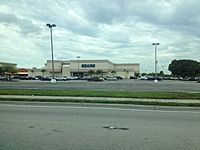
Hialeah is an important business area in Miami-Dade County. You can find many national stores here.
The city also has many local "mom-and-pop" shops. These smaller businesses do well even with big national stores around. Some supermarkets in Hialeah are specially designed for Latin American and Hispanic customers.
While Hialeah used to have many factories, new electronics and technology businesses have helped the city's economy grow. Westland Mall is a large shopping center with over 100 stores and restaurants. Telemundo, a big Spanish-language TV network, used to have its main office in Hialeah.
Fun Things to Do in Hialeah
Hialeah Park Race Track
In 2009, a big project began to restore the historic Hialeah Park Race Track. The park reopened for horse races and added slot machines. The plan is to make it an even bigger entertainment area with a hotel, restaurants, and a theater.
Parks and Recreation Centers
Hialeah has many places for outdoor fun. There are three tennis centers, five public swimming pools, and more than 14 public parks. These parks cover over 100 acres! Milander Park has a large auditorium and a football stadium that seats 10,000 people.
Amelia Earhart Park is also a great place to visit. It's a huge park with 515 acres. It has a special "Bark Park" for dogs, mountain biking trails, and a place for water sports like wakeboarding and paddleboarding.
Recently, the city has been developing the "Leah Arts district." This area is becoming a hub for music and entertainment, with places like the Factory Town concert venue.
Education in Hialeah
Public Schools
Miami-Dade County Public Schools serves the students in Hialeah.
Some high schools in Hialeah have received awards for being excellent. For example, Mater Academy Charter High School and Miami Lakes Tech were recognized as "Silver" award winners by U.S. News & World Report.
| Institution | Type | Grades | Enrollment | Nickname/mascot |
|---|---|---|---|---|
| Amelia Earhart Elementary School | Elementary | K–5 | 473 | Airplanes |
| Ben Sheppard Elementary School | Magnet | K–5 | 963 | Silver Hawks |
| Bob Graham Education Center | K–8 Center | K–8 | 1696 | Bobcats |
| City of Hialeah Educational Academy | Charter | 9–12 | 450 | Bulldogs |
| Earnest R. Graham K–8 Academy | K–8 Center | K–8 | 1455 | Eagles |
| Flamingo Elementary School | Elementary | K–5 | 950 | |
| Henry H. Filer Middle School | Middle | 6–8 | 1093 | Panthers |
| Hialeah Elementary School | Elementary | K–5 | 647 | Tigers |
| Hialeah Middle School | Middle | 6–8 | 872 | Broncos |
| Hialeah High School | Senior High | 9–12 | 2874 | Thoroughbreds |
| Hialeah-Miami Lakes High School | Senior High | 9–12 | 1668 | Trojans |
| iPrep Academy @ Hialeah-Miami Lakes | Magnet | 9–12 | 100 | Trojans |
| James H. Bright/J.W. Johnson Elementary School | Elementary | K–5 | 690 | Alligators |
| John G. DuPuis Elementary School | Elementary | K–5 | 637 | Dolphins |
| José Martí MAST 6-12 Academy | Magnet | 6–12 | 568 | Silver Knights |
| M.A. Milam K-8 Center | K–8 Center | K–8 | 976 | Colts |
| Mae M. Walters Elementary School | Elementary | K–5 | 625 | Eagles |
| Meadowlane Elementary School | Elementary | K–5 | 985 | Tigers |
| North Hialeah Elementary School | Elementary | K–5 | 573 | Eagles |
| North Twin Lakes Elementary School | Elementary | K–5 | 554 | |
| Palm Lakes Elementary School | Elementary | K–5 | 747 | Dolphins |
| Palm Springs Elementary School | Elementary | K–5 | 701 | Florida Panthers |
| Palm Springs Middle School | Middle | 6–8 | 1233 | Pacers |
| South Hialeah Elementary School | Elementary | K–5 | 1107 | Sharks |
| Twin Lakes Elementary School | Elementary | K–5 | 565 | Eagles |
| Westland Hialeah High School | Magnet | 9–12 | 2137 | Wildcats |
| Youth Co-Op Preparatory Charter School | Charter | K–12 | Tigers |
Private Schools
- Champagnat Catholic School
- Edison Private School
- Horeb Christian School
- Immaculate Conception School
- Our Lady of Charity School
- St. John the Apostle School
Colleges and Universities
- Miami-Dade College has a campus in Hialeah. It's been an important academic center since 1980.
- Private colleges include ASA College, College of Business and Technology, and Florida National University.
Public Library System
The Hialeah public library started in 1924, even before the city was officially formed. Unlike many other libraries in the county, Hialeah's libraries operate independently.
The first library was in the home of Ms. J Sommers Garwood, a member of the Hialeah Women's Club. This club was founded by Ms. Lua Adams Curtiss, who was the mother of Glenn Curtiss. The newest branch, the John F. Kennedy Library, is now the main library. It has beautiful murals, new furniture, and a special collection about Hialeah's history.
Transportation in Hialeah
Hialeah is well-connected to other areas by various transportation options.
Train Services
You can use Miami-Dade Transit's Miami Metrorail and Tri-Rail to travel around Hialeah and to other cities. Amtrak also has a station here for longer train journeys.
Metrorail Stations:
- Tri-Rail/Metrorail Transfer
- Hialeah
- Okeechobee
Tri-Rail Stations:
- Tri-Rail/Metrorail Transfer
- Hialeah Market
Amtrak Station:
- Amtrak-Miami: Silver Star and Silver Meteor services
Major Roads
Hialeah is connected by several important roads, making it easy to drive to and from the city:
 Interstate 75
Interstate 75 State Road 826 (Palmetto Expressway)
State Road 826 (Palmetto Expressway) Homestead Extension of Florida's Turnpike
Homestead Extension of Florida's Turnpike U.S. Route 27 (Okeechobee Road)
U.S. Route 27 (Okeechobee Road) State Road 924 (Gratigny Parkway)
State Road 924 (Gratigny Parkway)
Famous People from Hialeah
Many notable people have connections to Hialeah, including:
- Alex Avila, baseball player
- Agustin Anello, soccer player
- Jacqueline Becerra, federal judge
- Terry Borcheller, racing driver
- Devin Bush, NFL football player
- Maria Canals-Barrera, actress
- Rene Capo, Olympic judoka
- Harry Wayne Casey, lead singer of KC and the Sunshine Band
- Chris Corchiani, NBA basketball player
- Nestor Cortes, MLB pitcher
- Erik Courtney, TV personality
- Jack Daugherty, baseball player
- Rohan Davey, NFL quarterback
- Bucky Dent, professional baseball player
- Vincent D'Onofrio, actor and producer
- Nick Esasky, baseball player
- Luis Exposito, baseball player
- Bobby Estalella, baseball player
- Wifredo A. Ferrer, U.S. attorney
- René García, politician
- Gio González, MLB pitcher
- Luchi Gonzalez, soccer coach
- Ted Hendricks, NFL football player
- Charlie Hough, professional baseball player
- Richard Hough, professional baseball player
- Greg Jackson, football player
- Catherine Keener, Oscar-nominated actress
- Barbara Lagoa, judge
- Corey Lemonier, NFL defensive end
- Manny Machado, baseball player
- Kiel Martin, actor
- Lizbet Martínez, violinist and teacher
- Raúl L. Martínez, former mayor of Hialeah
- Maria Molina, meteorologist
- Oscar Múñoz, MLB pitcher
- Roell Preston, professional football player
- Mike Rio, mixed martial arts fighter
- Julio Robaina, former mayor of Hialeah
- Rick Sánchez, journalist
- Jon Secada, Grammy Award–winning musician
- Michael Timpson, NFL wide receiver
- Ariel Torres, Olympic karateka
- Rocco Valdes, music producer and songwriter
Images for kids
See also
 In Spanish: Hialeah para niños
In Spanish: Hialeah para niños
 | Delilah Pierce |
 | Gordon Parks |
 | Augusta Savage |
 | Charles Ethan Porter |



